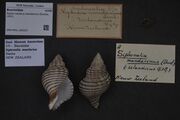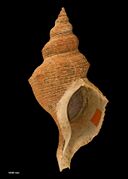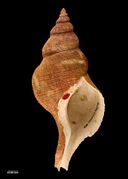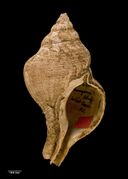Biology:Penion sulcatus
| Penion sulcatus | |
|---|---|
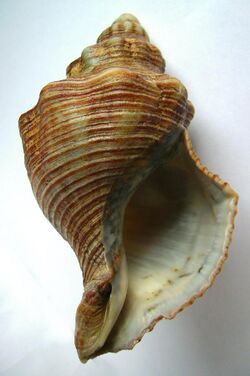
| |
| Dorsal view of a shell of Penion sulcatus | |
| Scientific classification | |
| Domain: | Eukaryota |
| Kingdom: | Animalia |
| Phylum: | Mollusca |
| Class: | Gastropoda |
| Subclass: | Caenogastropoda |
| Order: | Neogastropoda |
| Family: | Austrosiphonidae |
| Genus: | Penion |
| Species: | P. sulcatus
|
| Binomial name | |
| Penion sulcatus (Lamarck, 1816)
| |
| Synonyms | |
|
Fusus sulcatus Lamarck, 1816 | |
Penion sulcatus is a species of medium-to-large predatory marine snail or whelk, commonly called the northern siphon whelk or kākara nui in Māori, belonging to the whelk family Austrosiphonidae.[1]
Description
Penion sulcatus is a medium-to-large species of Penion siphon whelk.[2][3] Shells are highly variable in sculpture and colouration, but shells are often dark with a white aperture.[4]
The extinct species Penion exoptatus, Penion clifdenensis, and potentially also Penion marwicki, may belong to the same evolutionary lineage as the extant species Penion sulcatus.[5] This hypothesis is based on geometric morphometric analysis of shell shape and size for all four taxa, as well as the analysis of morphometric variation exhibited all living species of Penion.[5]
Distribution
Penion sulcatus is endemic to New Zealand.[2][3][6] The species is found of the entire North Island and northern South Island coasts.[3][6] The species has an abundant fossil record in the North Island of New Zealand.[7]
P. sulcatus is benthic and is common on soft-sediments on the continental shelf [8] or within the subtidal rocky shore environment.[4][3]
Ecology
Penion sulcatus is a carnivore and is known to feed on mussels and Dosina zelandica zelandica.[4]
Human use
Shells found in middens of historic Māori settlements indicate that P. sulcatus may have been intentionally foraged as a food-source.[9][10]
References
- ↑ Kantor, Yuri I.; Fedosov, Alexander E.; Kosyan, Alisa R.; Puillandre, Nicolas; Sorokin, Pavel A.; Kano, Yasunori; Clark, Roger; Bouchet, Philippe (2022). "Molecular phylogeny and revised classification of the Buccinoidea (Neogastropoda)". Zoological Journal of the Linnean Society 194 (3): 789–857. doi:10.1093/zoolinnean/zlab031. https://doi.org/10.1093/zoolinnean/zlab031.
- ↑ 2.0 2.1 Powell A. W. B., New Zealand Mollusca, William Collins Publishers Ltd, Auckland, New Zealand 1979 ISBN:0-00-216906-1
- ↑ 3.0 3.1 3.2 3.3 Vaux, Felix; Crampton, James S.; Marshall, Bruce A.; Trewick, Steven A.; Morgan-Richards, Mary (2017). "Geometric morphometric analysis reveals that the shells of male and female siphon whelks Penion chathamensis are the same size and shape". Molluscan Research 37 (3): 194–201. doi:10.1080/13235818.2017.1279474.
- ↑ 4.0 4.1 4.2 Willan, R.C., de C. Cook, S., Spencer, H.G., Creese, R.G., O’Shea, S., Jackson, G.D. Phylum Mollusca. In: de C. Cook, S.C. (eds.), New Zealand Coastal Marine Invertebrates 1, 406 – 407. Canterbury University Press, Christchurch, New Zealand ISBN:978-1877257-60-5
- ↑ 5.0 5.1 Vaux, Felix; Gemmell, Michael R.; Hills, Simon F.K.; Marshall, Bruce A.; Beu, Alan G.; Crampton, James S.; Trewick, Steven A.; Morgan-Richards, Mary (2020). "Lineage Identification Affects Estimates of Evolutionary Mode in Marine Snails". Systematic Biology 69 (6): 1106–1121. doi:10.1093/sysbio/syaa018. PMID 32163159. https://zenodo.org/record/4739380.
- ↑ 6.0 6.1 Vaux, Felix; Hills, Simon F.K.; Marshall, Bruce A.; Trewick, Steven A.; Morgan-Richards, Mary (2017). "A phylogeny of Southern Hemisphere whelks (Gastropoda: Buccinulidae) and concordance with the fossil record". Molecular Phylogenetics and Evolution 114 (2017): 367–381. doi:10.1016/j.ympev.2017.06.018. PMID 28669812.
- ↑ Beu, Alan G.; Maxwell, P.A. (1990). "Cenozoic Mollusca of New Zealand". New Zealand Geological Survey Paleontological Bulletin. New Zealand Geological Survey Bulletin (Lower Hutt, New Zealand: New Zealand Department of Scientific and Industrial Research) 58. ISSN 0114-2283. https://www.gns.cri.nz/gns/Home/Our-Science/Land-and-Marine-Geoscience/Paleontology/Online-Resources/Cenozoic-Mollusca-of-New-Zealand.
- ↑ Dell, R.K. 1962. New Zealand Marine Provinces - do they exist? Tuatara, 10: 43 - 52. Online Copy courtesy of New Zealand Electronic Text Collection
- ↑ Green, R.C.; Pullar, W.A. (1960). "Excavations at Orongo Bay, Gisborne". The Journal of the Polynesian Society 69 (4): 332–353.
- ↑ Allen, Melinda S. (2012). "Molluscan foraging efficiency and patterns of mobility amongst foraging agriculturalists: a case study from northern New Zealand". Journal of Archaeological Science 39 (2012): 295–307. doi:10.1016/j.jas.2011.09.013. Bibcode: 2012JArSc..39..295A.
External links
- Museum of New Zealand Te Papa Tongarewa, Taxon: Penion sulcatus Lamarck, 1816 (Species)
- Revised descriptions of New Zealand Cenozoic Mollusca from Beu and Maxwell (1990): Penion sulcatus (Lamarck, 1816)
- Massey University NZ Fauna Scanned 3D model of Penion sulcatus
- Natural History Museum Rotterdam - Mollusca - Gastropoda - Buccinidae
Wikidata ☰ Q3142851 entry
 |
